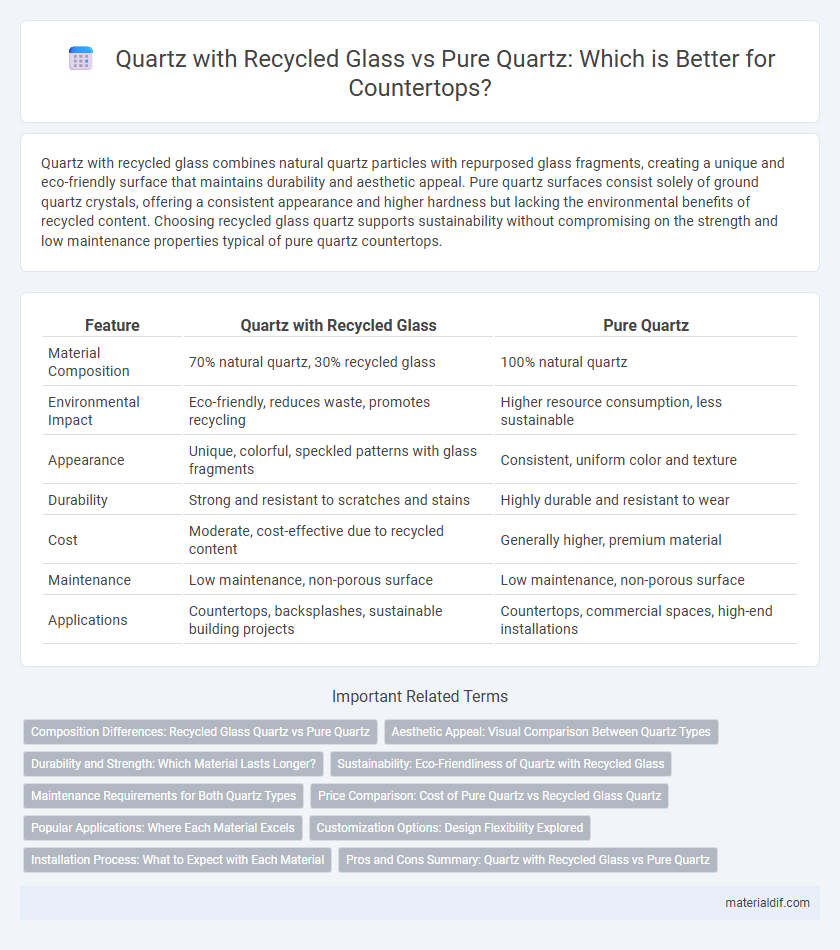Quartz with recycled glass combines natural quartz particles with repurposed glass fragments, creating a unique and eco-friendly surface that maintains durability and aesthetic appeal. Pure quartz surfaces consist solely of ground quartz crystals, offering a consistent appearance and higher hardness but lacking the environmental benefits of recycled content. Choosing recycled glass quartz supports sustainability without compromising on the strength and low maintenance properties typical of pure quartz countertops.
Table of Comparison
| Feature | Quartz with Recycled Glass | Pure Quartz |
|---|---|---|
| Material Composition | 70% natural quartz, 30% recycled glass | 100% natural quartz |
| Environmental Impact | Eco-friendly, reduces waste, promotes recycling | Higher resource consumption, less sustainable |
| Appearance | Unique, colorful, speckled patterns with glass fragments | Consistent, uniform color and texture |
| Durability | Strong and resistant to scratches and stains | Highly durable and resistant to wear |
| Cost | Moderate, cost-effective due to recycled content | Generally higher, premium material |
| Maintenance | Low maintenance, non-porous surface | Low maintenance, non-porous surface |
| Applications | Countertops, backsplashes, sustainable building projects | Countertops, commercial spaces, high-end installations |
Composition Differences: Recycled Glass Quartz vs Pure Quartz
Recycled glass quartz incorporates a significant percentage of crushed recycled glass combined with natural quartz and resin, creating a composite material that emphasizes sustainability while maintaining durability. Pure quartz surfaces consist primarily of approximately 90-95% natural quartz crystals bound with resin, resulting in a consistent, non-porous composition with minimal inclusions. The incorporation of recycled glass not only alters the visual texture and color spectrum but also impacts the material's mechanical properties and environmental footprint compared to pure quartz slabs.
Aesthetic Appeal: Visual Comparison Between Quartz Types
Quartz with recycled glass showcases a vibrant mosaic of colors and textures, creating a unique and eye-catching surface that contrasts sharply with the uniform appearance of pure quartz. The embedded recycled glass pieces reflect light differently, adding depth and a dynamic shimmer that pure quartz lacks. This interplay of refracted light and varied patterns enhances the aesthetic appeal, making recycled glass quartz a popular choice for designers seeking distinctive visual interest.
Durability and Strength: Which Material Lasts Longer?
Quartz with recycled glass maintains high durability comparable to pure quartz due to its strong resin binder and quartz aggregate composition. Pure quartz, known for its natural hardness and resistance to scratches and heat, tends to have slightly greater longevity in heavy-use environments. Both materials offer excellent strength, but pure quartz generally lasts longer in extreme conditions because it lacks the minor brittleness sometimes introduced by recycled glass fragments.
Sustainability: Eco-Friendliness of Quartz with Recycled Glass
Quartz with recycled glass offers a significant sustainability advantage over pure quartz by reducing waste and minimizing the need for virgin raw materials. Incorporating recycled glass lowers the environmental impact through energy savings in production and diverts glass from landfills, promoting circular economy principles. This eco-friendly approach enhances the overall green credentials of quartz surfaces while maintaining durability and aesthetic appeal.
Maintenance Requirements for Both Quartz Types
Quartz with recycled glass requires similar low-maintenance care as pure quartz but may need gentle cleaning agents to avoid damaging the embedded glass pieces. Both materials resist staining and scratching, reducing the need for frequent maintenance compared to natural stone. Sealing is generally unnecessary for both quartz types, ensuring hassle-free upkeep and long-lasting durability.
Price Comparison: Cost of Pure Quartz vs Recycled Glass Quartz
Pure quartz countertops generally cost between $50 to $100 per square foot, reflecting the high purity and durability of natural quartz materials. Recycled glass quartz surfaces typically range from $40 to $80 per square foot, offering a more budget-friendly option while maintaining aesthetic appeal through embedded glass fragments. The price difference stems from sourcing and processing, with recycled glass quartz benefiting from lower raw material costs and environmental sustainability incentives.
Popular Applications: Where Each Material Excels
Quartz with recycled glass excels in eco-friendly kitchen countertops and bathroom vanities, combining durability with sustainable design. Pure quartz is preferred for high-traffic commercial flooring and laboratory surfaces due to its superior hardness and non-porous nature. Both materials offer heat resistance and stain protection, but recycled glass quartz stands out in environmentally conscious residential projects.
Customization Options: Design Flexibility Explored
Quartz with recycled glass offers extensive design flexibility, incorporating vibrant glass fragments that create unique, eco-friendly surfaces not achievable with pure quartz. Pure quartz provides consistent color and texture but limits customization to uniform patterns and shades. The integration of recycled glass enhances customization options by enabling varied textures, reflective qualities, and sustainable appeal in quartz countertops.
Installation Process: What to Expect with Each Material
Quartz with recycled glass involves a slightly more delicate installation process due to the embedded glass pieces, requiring experienced fabricators to prevent chipping or cracking. Pure quartz slabs are generally more uniform and robust, allowing for smoother cutting and installation with standard tools. Both materials demand professional handling, but recycled glass quartz may need additional care during edge polishing to enhance durability and aesthetic appeal.
Pros and Cons Summary: Quartz with Recycled Glass vs Pure Quartz
Quartz with recycled glass offers enhanced sustainability by incorporating eco-friendly materials that reduce waste and environmental impact, while pure quartz provides consistent purity and uniform appearance. Recycled glass quartz can exhibit unique color variations and slight texture differences, which may appeal aesthetically but could pose challenges for matching in large installations, whereas pure quartz ensures more predictable and homogeneous surfaces. Cost-wise, recycled glass quartz is often more affordable due to lower raw material expenses, but pure quartz tends to have higher durability and resistance to scratches and stains.
Quartz with Recycled Glass vs Pure Quartz Infographic

 materialdif.com
materialdif.com